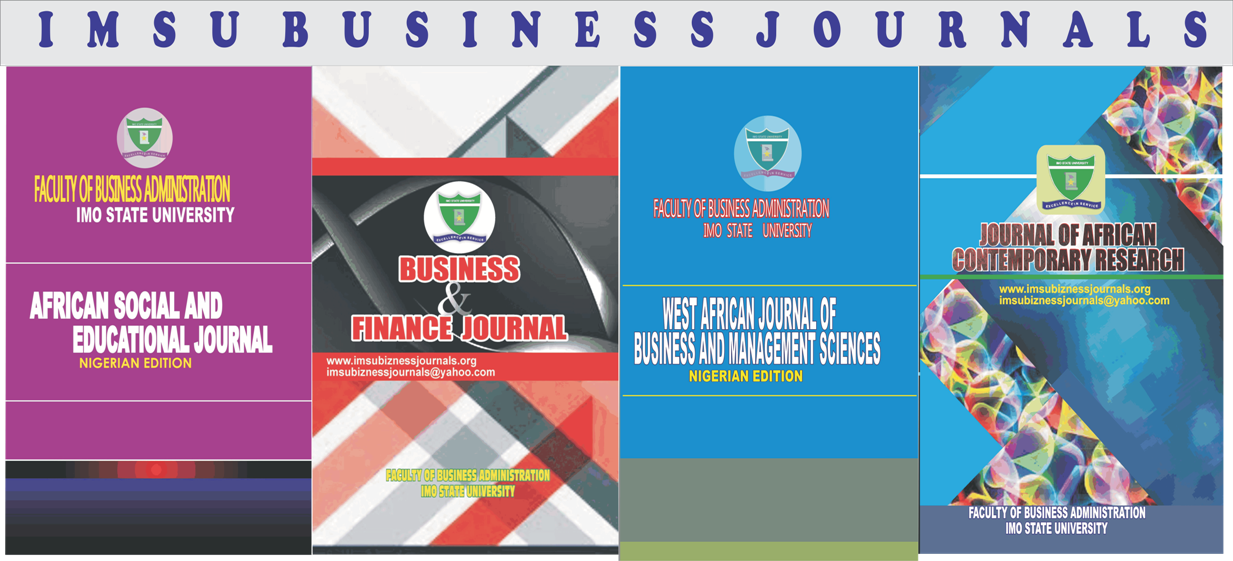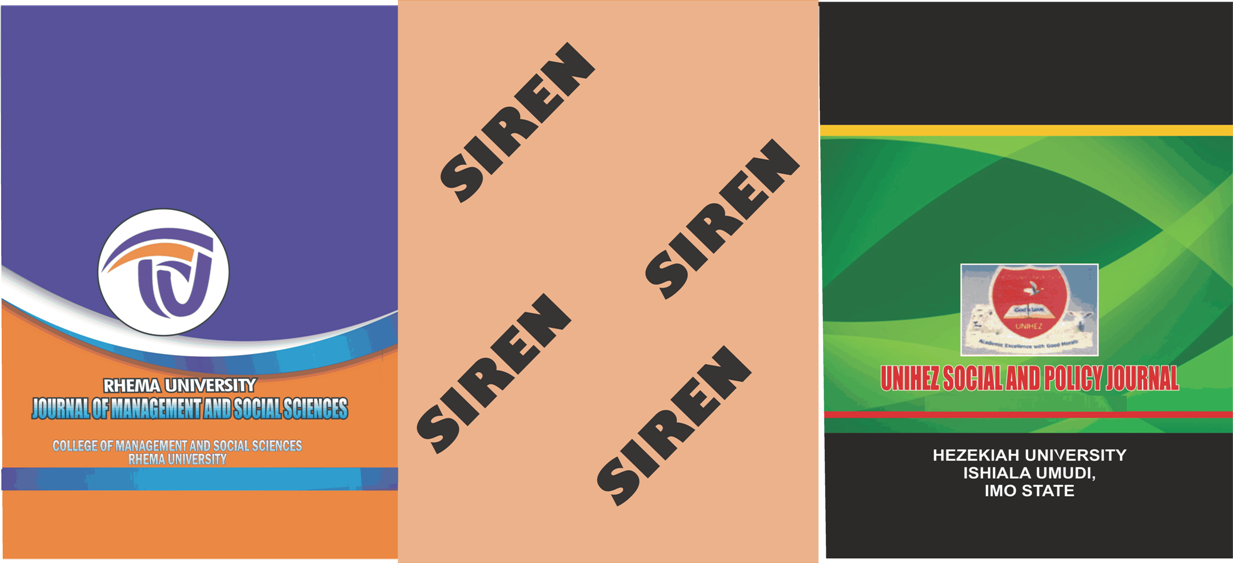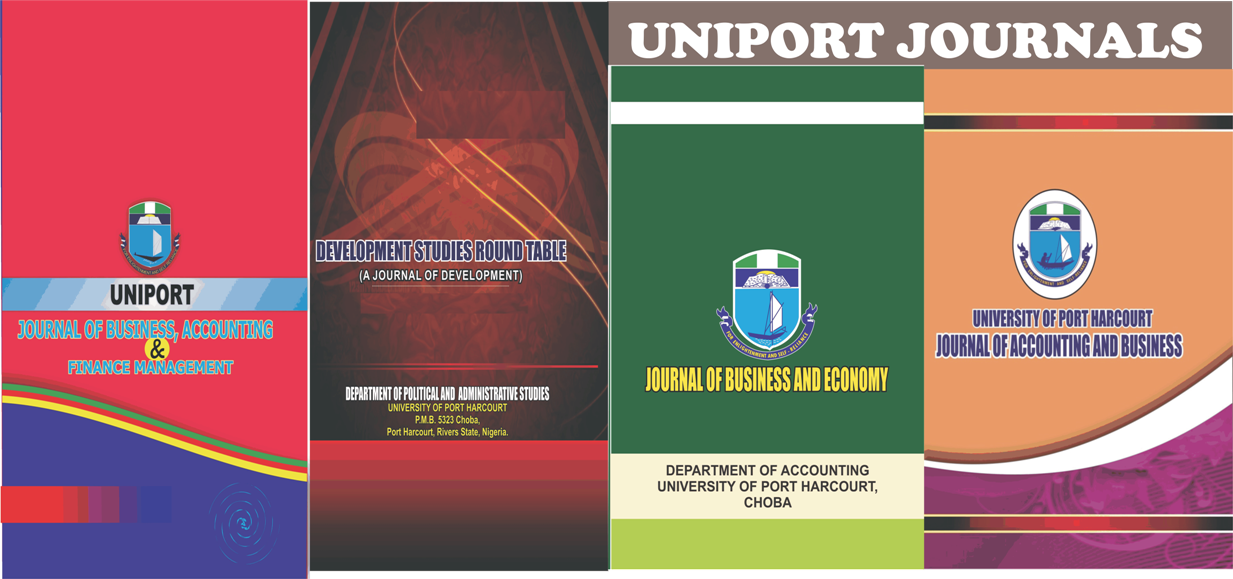2019 Archive
| 1 |
Title: CURRENCY ORDER FLOW EXCHANGE RATE DYNAMICS AND MARKET INTERVENTION EMPIRICAL EVIDENCE FROM THE MALAYSIAN AND THAILAND FOREIGN EXCHANGE MARKETS..pdf Author: Anifowose Abolaji Daniel, PhD. Abstract: This paper presents empirical test results of Malaysian and Thailand foreign exchange market microstructure assessment of exchange rate dynamics and market intervention. The study investigates whether currency order flow captures the movement of exchange rate of MYR and THB against US dollar, and how the long-term and short-term components impact the relative estimation of MYR and THB in the international markets. The study construct a measure of currency order flow in the Malaysian and Thailand foreign exchange markets to reflect the pressure of currency excess demand. VAR model is applied to estimate the important role of currency order flow in the determination of the currency exchange rate for the Malaysian ringgit (MYR) and Thailand Bath (THB) against the US dollar (USD). A hybrid model of order flow and exchange rate dynamics proposed by Evans and Lyons (2002a) and extended by Zhang et al (2013) is applied to the countries’ foreign exchange market (MYR/USD and THB/USD) to analyze a dataset of every fifteen-minute currency order flow and exchange rate movements from January 2010 to December 2015. Also, the effectiveness of foreign exchange market intervention by the duo central banks (Bank Negara, Malaysia and Central Bank of Thailand) is tested through the behavior of currency order flow. The findings reveal that currency order flow explains an important portion of the movement in the MYR-USD and THB-USD exchange rate. And that, the exchange rates of these countries are sensitive to foreign exchange market intervention. Keywords: Currency order flow, Exchange rate, Foreign exchange market, Market intervention. View |
| 2 |
Title: FAMILY BUSINESS SUCCESSION CHALLENGES AND OPTIONS A DEVELOPING ECONOMY EXPERIENCE.pdf Author: Okeke Raymond Njelita & Chukwuezi Franklin Nzubechukwu Abstract: The study of the relationship between family and business is receiving widespread attention from a variety of audience including academia, consultancy and policy support agencies. Despite The importance of family owned businesses in modern economies, family businesses in the developing economies have received little attention in research in the developing economies not minding that the institution of family and economy have always been broadly interrelated. The research instrument used for data collection was questionnaire structured in line with 5 point Likert scale. A sample size of 553 was used. The completed questionnaire was collected, coded and subsequently analyzed using ANOVA. The findings reveal that there are significant challenges of traditional inheritance system, polygamy, pride of ownership, attitude of other family member, etc. Vision and drive, value and standards, communication skill, individual personality, patience and openness are individual qualities that help family business succession activities. Keywords: Family business, succession, challenges, developing economy, tradition and culture. View |
| 3 |
Title: RESPONSIBILITY FACTORS AND AUDIT EXPECTATION GAP IN LISTED DEPOSIT MONEY BANKS IN NIGERIA.pdf Author: Aminu B., Terzungwe N., PhD., Joshua O., PhD. & Mohammed N. A., PhD. Abstract: This paper examines the Responsibility factors as determinants of Audit Expectation Gap in Listed Deposit Money Banks in Nigeria. The study used a sample of 385respondents from the target population –Investors/Shareholders, Lenders and Other Creditors.Questionaire drawn on a five point likert scale was used to collect data from the respondents, after it has been pilot tested for validity and reliability. The statistical tools used for the analysis are the descriptive statistics, ANOVA, normality graph and the multiple regression analysis. The major independent variables examined in the study are 20 cutting across various responsibilities factors for audit expectation gap. The study finds that ignorance about the role and responsibilities of an auditor such as expecting auditor to detect and prevent fraud, 100 percent accuracy, verifying every transaction, detection of deliberate distortions by the users of financial statement contributes to audit expectation gap. It is recommended that the regulatory authority of Banks like the Central Bank of Nigeria and respective banks in Nigeria need to enlighten and educate users of financial statements on the roles and responsibilities of an Auditor as provided by laws and professional standards as against users expectations which compound the expectation gap problems.. Keywords: Audit Expectation Gap, Responsibility Factors, Deposit Money Banks, Audit, Financial Statement Users. View |
| 4 |
Title: IMPACT OF GENDER ON CUSTOMER PATRONAGE OF FASHION DESIGNERS IN OSUN STATE.pdf Author: Aje Catherine Oluyemi, PhD. & Fawale Olusola Olanike Abstract: In line with the observation by several researchers, Nigeria is a creative hub of talented designers. Male and Female are rushing into the fashion business, thereby bringing about continuous growth and investment in the world of fashion. It is therefore necessary to investigate the impact of gender on customer patronage of fashion designers in Nigeria. This is why this study attempts to uncover the factors that influence the patronage of male and female designers. The study adopted the descriptive research design. Respondents were randomly selected from two local government areas in Osun State. A sample size of 97 respondents was used for the purpose of this study. The hypothesis formulated was tested using the multiple regression analysis in SPSS version 20.0 version. The result shows the value of co-efficient R of female fashion designers as 0.891 while that of male as 0.610. Therefore, the study found that Female designers are more patronised than their male counterparts in the study area. Following the findings of the study, it is recommended among others, that both male and female designers should be more empowered to boost their morale and business to serve customers better. Keywords: Gender, Fashion Designer, Patronage, Consumer Behaviour. View |
| 5 |
Title: WORKING CAPITAL MANAGEMENT AND FINANCIAL PERFORMANCE OF COMMERCIAL BANK IN NIGERIA.pdf Author: Akhanoba S. Abstract: Working capital is regarded as the lifeblood and nerve of a business concern, it is therefore essential to accommodate the smooth operations of any organization, but Studies in working capital management have provided inconclusive results. The objective of this study is to examine the effect of working capital management of Commercial Banks in Nigeria. The study covers the period of six years 2007 to 2013. Data for the study were extracted from the firms’ annual reports and accounts. After running the OLS regression, a robustness test was conducted for validity of statistical inferences, the data was empirically tested between the regressors and the regressed, A multiple regression was employed to test the model of the study using OLS. The results from the analysis revealed a strong positive relationship between current ratio and quick ratio and ROA of Listed Commercial Banks in Nigeria, while cash ratio was found to be inversely but significantly related to ROA of Listed Commercial Banks in Nigeria. In line with the above findings, the study recommended that the management should put more attention on their liquidity in order to maintain an adequate liquidity as the study has empirically proved that higher liquidity signifies more profitability, the listed Commercial Banks in Nigeria should try and maintain a higher quick ratio as it will have a positive impact on their profitability. Finally, the management should reduce the amount held in cash as current asset and concentrate more in investing them, so that it could yield higher return rather than tie down the idle cash. Keywords: Current ratio, Quick ratio, Cash ratio, Firm size, Return on Asset and Trade-off theory. View |
| 6 |
Title: TAX PAYMENT OBLIGATIONS AND ATTITUDE OF NIGERIANS IN SELECTED LOCAL GOVERNMENT AREAS IN OSUN STATE NIGERIA.pdf Author: Osunwole O.O., Oluwatosin E. O. & Adeyemi O. A. Abstract: All over the world, tax is a controversial issue and Nigeria is not an exception. The case of Nigeria is made even the more peculiar because as the government and its agencies always make-out that citizens are not responding to tax payments as much as they should leading to a situation of tax-gap, so the citizens too are always quick to observe that government is not doing much in meeting their socio-welfare needs – giving rise to the expectation-gap phenomenon. Thus, this study examined the factors that drive the attitude of the Nigerian taxpayers towards their tax obligations and sought plausible solutions to the problems of tax-gap. The population for this study was the five thousand (5000) individuals who reside and work within the six selected local government areas in Osun state, Nigeria whose incomes are taxable under the provisions of the Personal Income Tax Act, 2004 as amended. Convenience sampling technique and the Slovin’s formula were employed to arrive at 370 respondents that participated in the study. Primary data was used for the study. Questionnaires were used as data collection tools. The study results established that there is a significant relationship between the taxpayers understanding of the concept of tax and voluntary compliance of tax obligations. The study concluded that taxpayers’ understanding of the notion of tax is inadequate and that the actions or inactions of government do influence the attitude of Nigerian taxpayers towards their tax obligations. The study recommends that government and its agencies should embark on aggressive tax education and enlightenment campaigns, while simultaneously taking steps to reduce the culture of wastes and corruption in governance and increase transparency in the use of tax funds as part of measures to combat the tax-gap problem. Key Words: Attitudes, Transparency, Tax Avoidance and Evasion, Tax Obligations, Waste, Corruption. View |
| 7 |
Title: BUSINESS CREDIT ACCESSIBILITY AND PERFORMANCE OF SMALL AND MEDIUM SCALE ENTERPRISES IN NIGERIA.pdf Author: Ojenike Joseph O. PhD. & Shodiya Olayinka A. Abstract: Access to finance boosts SMEs productivity and hence becomes sustainable by utilizing the economies of scale. This study, therefore, examined the relationship between business credit accessibility and the performance of SMEs in Abeokuta North Local Government, Ogun State. A survey research design was adopted for the study. SMEs in Abeokuta North, Ogun State constituted the population for this study. Two hundred and sixty-one registered SMEs in Abeokuta North, out of which 52 were randomly selected as the sample for the study. The questionnaire was the major research instrument used for data collection and descriptive and regression analyses were used in analyzing the collected data. Findings revealed that family and friends are the major sources of business credit available to SMEs owner; that SMEs owners use their business credit major for expanding their business; their business size, legal status and years of operation are the majorly business characteristics that hinder SMEs accessibility to business credit. Finally, this study concluded that business credit facilitates SMEs performance. Based on the findings, the study recommended that efforts should be put in place to make sure that better access to business credit, particularly through the microfinance banks, is being guaranteed; it is also recommended that proper orientation, training, and workshop should be organized by appropriate parastatals, non-governmetal organization and financial institution on other meaningful ways in which SMEs owners can utilize their business credit in improving the performance of their businesses. Keywords: Business Credit Accessibility, Small and Medium Scale Enterprises, Entrepreneur, Performance, Businesses. View |
| 8 |
Title: FINANCIAL SECTOR DEEPENING AND ECONOMIC PRODUCTIVITY IN NIGERIA AN EXPLORATORY SURVEY.pdf Author: Andrew O. Agbada, PhD. Abstract: This study examined Financial Sector Deepening and Economic Productivity in Nigeria. The different dimensions that financial deepening takes in an economy, namely: Development of financial markets, Development of financial institutions and Diversity in financial instruments served as proxies for it and were adopted as independent variables. The study employed ‘Random sampling technique’ for data collection using structured questionnaire designed to conform with ‘Item-Specific-Response-Options approach. Analysis of data was carried out utilizing Pearson’s Product-Moment Correlation Co-efficient (PPMCC) denoted by the letter ‘r’. The findings were sturdy revealing that all the independent variables exhibited positive signs, thus indicating positive correlation with Economic productivity in Nigeria. However, the correlation coefficients of two variables were considered low, though, a little below 50% and the third variable showed a moderately sufficient or middling coefficient, a little above 50%. Based on these results, we concluded that the strength of relationship between financial sector deepening and Economic productivity in Nigeria was on the average – middling relationship. For financial markets and institutions to perform exceptionally, we recommend that stakeholders should endeavour to provide modern technologies and infrastructures to replace aging and outdated ones as such may have had negative impact on productivity processes. We also recommend training and re-training for the workforce of the financial markets and institutions particularly now that most financial transactions have been automated. Keywords: Financial, Deepening, Development, Market, Institution, Instrument, Nigeria. View |
| 9 |
Title: GREEN COST ACCOUNTING AND FINANCIAL PERFORMANCE OF LISTED OIL AND GAS FIRMS IN NIGERIA..pdf Author: Ozoanigbo Chinedu V. & Ofor, Theresa Nkechi, PhD. Abstract: This study examined the effect of Green Cost Accounting on Financial Performance of selected oil and gas firms listed on Nigeria Stock Exchange. The study used Waste Management Cost, Litigation and Fine Cost, Gas Flaring Penalty, and Pollution Control Cost as proxy for Independent variables, while Net Profit Margin was used as proxy for Dependent variable. Secondary source of data was employed while the research design was based on ex-post facto design. The data was collected from ten (10) listed oil and gas firms for a period of five (5) years, between 2012 to 2016. The data collected were analyzed using descriptive statistics, correlation and multiple regression analysis. The result showed that Waste Management Cost and Gas Flaring penalty cost have positive and significant effect on Financial Performance of selected oil and gas firms at 1% and 5% significant levels respectively. The study also found that 56% of the changes in total variations on the Dependent Variable can be attributed to the joint effect of all the explanatory variables, while the remaining 44% was the error term. The study therefore, recommends among others, that oil and gas companies should invest heavily in Waste Management and Gas Flaring reduction program as both have statistical significant effect on their profit margin. Key Words: Green Cost Accounting; Waste Management; Gas flaring; Pollution; Performance. View |
| 10 |
Title: ANALYSIS OF ENTREPRENEURIAL MARKETING AND MARKET PERFORMANCE OF SMALL BUSINESSES IN NORTH CENTRAL NIGERIA..pdf Author: Olorunlambe Gasali Alabi, Abdulraheem Issa, PhD. & Zekeri Abu, PhD. Abstract: Organizations are said to be operating in a turbulent and hyper competitive environment, and it is their desire to continue to operate successfully by creating and delivering superior value to their customers while also learning how to adapt to a continuous and dynamic business environment. This study examines the effect of entrepreneurial marketing on market performance. The target population was registered businesses in the North Central Geopolitical Zone of Nigeria. Primary source of data collection was utilized with the aid of a structured questionnaire. Based on the findings of this study, the study concludes that entrepreneurial marketing which entails innovativeness, proactiveness, customer intensity, value creation significantly impact market performance. Based on the findings, the study recommends that the efforts of the government on entrepreneurship training development should be stepped up and strengthened to promote passion for self-employment among Nigerians as a reliable way of reducing the current high level of unemployment and under-employment in the country. Keywords: Entrepreneurship, Marketing, Performance, Small Businesses, Nigeria. View |
| 11 |
Title: RISK MANAGEMENT ON CORPORATE PERFORMANCE IN THE NIGERIAN BANKING SECTOR.pdf Author: James Kereotu Oyadonghan, PhD. Abstract: This study examined the effect of risk management on bank performance in Nigeria. Two bank performance indicators (return on assets and return on equity) were used as the dependent variables while unsystematic risk management measures including credit risk, liquidity risk, operational risk and capital adequacy risk are the independent variables. The data for the study covering 23 years from 1994 to 2016 were obtained from NDIC annual reports. The SPSS was used to run OLS regression analysis. Results of VIF and Durbin Watson statistics for multicolinearity and autocorrelation respectively confirmed the suitability of the models and reliability of the results. Coefficient of determination showed that risk management variables explained 41% and 23% of changes in return on equity and return on assets respectively. Furthermore, credit risk has a significant negative effect on return on equity and insignificant negative effect on return on assets; Liquidity Management has no significant effect on bank performance; Operational risk has no significant effect on bank performance in Nigeria; while capital adequacy has a significant positive effect on return on equity but a negative insignificant effect on return on assets. The study concluded that there is a poor risk management practice in Nigerian banks. Among others, it recommended that the CBN and other regulators should endeavor to enforce risk identification, assessment, measurement and control mechanisms in line with global best practices in other to avoid financial crisis and also improve on commercial banks’ performance. Key Words: Risk, management, corporate, Banking, performance and, Nigeria. View |
| 12 |
Title: THE EFFECTS OF FINANCIAL ACCOUNTING TOOLS FOR MONITORING LIQUIDITY LEVELS IN BUSINESS ORGANIZATIONS IN NIGERIA.pdf Author: Bingilar, Paymaster Frank, PhD. & Ugeh Chidi H. Abstract: The study sought to establish the effect of liquidity management on profitability of business organizations in Nigeria. Liquid assets are less profitable as compared to long term assets. The dilemma to a finance manager is whether to invest in more profitable long term assets and risk low liquidity or invest in short term assets which are less profitable and therefore reduce return on investment made. The population of the study comprised of all 19 business organizations in Nigeria. For a bank to qualify it needed to have been in operation during the whole period of the study and therefore institutions that merged or were not in operation in the whole period of study were eliminated. The study involved secondary data collection of the return on assets to measure profitability, Cash and cash equivalent to measure liquidity, Capital ratio and Deposit ratio as profitability determinants during a specific year. The study used secondary data obtained from audited financial statements of the banks at the end of the years of study. The study used descriptive statistics and regression analysis to establish the relationship between the study variables. The response rate was 63% that is a total 27 out of 40 that satisfied the data collection criteria. The study found out that there is a positive relationship between profitability and liquidity management of business organizations in Nigeria. Liquidity management is found to be one of the determinants of profitability of business organizations in Nigeria over the years of study. The study recommends that the finance managers of business organizations maintain a balance between the level of liquid assets and long term assets to reinforce each of the conflicting objectives of maintaining adequate liquidity and sustainable profitability. Additionally the liquidity requirements that have been set by CBN need to be maintained and strengthened since liquidity is found to have a positive effect on profitability of business organizations stability and growth of the entire financial and economic. Keywords: Accounting tools, Liquidity levels, Monitoring, Financial accounting and Business organization. View |





